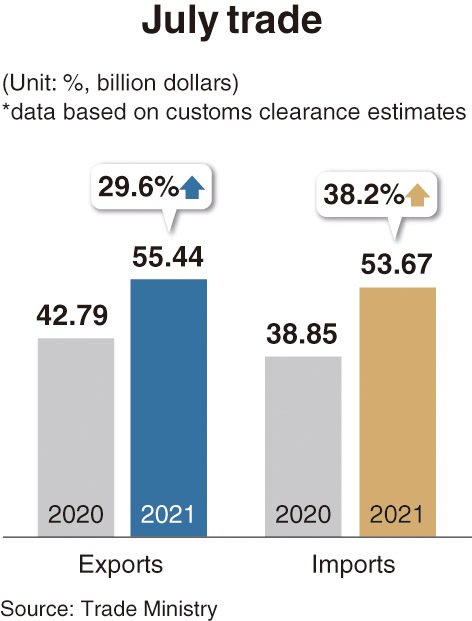South
Korea’s exports in July surged 29.6 percent to $55.4 billion on-year, a record
monthly figure since the nation began compiling the data in 1956, according to
the Trade Ministry Sunday.
In the first seven months of this year, Korea’s accumulated exports were worth
$358.7 billion, setting another record. Also, this is the first time in 10
years that the country saw double digit growths for four consecutive months in
10 years — 41.2 percent in April, 45.6 percent in May, 39.8 percent in 29.8
percent and 29.6 percent in July.
“For
two straight months from June to July, exports of the nation’s 15 core products
all increased, 13 of them witnessing double-digit growths. Also, for four
consecutive months, Korea’s exports grew in all nine major markets,” a Trade
Ministry official said.
Private and public experts, including those at the Korea Institute for
Industrial Economics and Trade and the Bank of Korea, estimate the nation’s
exports this year at between $601.7 billion and $610.5 billion, while its trade
volume is projected at $1.15 trillion to $1.19 trillion.
The record performance was propelled by robust exports in both conventional and
new sectors.
Overseas sales of chips, fueled by global server demands, spiked 39.6 percent
to reach $11 billion in July on-year, surpassing $10.4 billion in July 2018
when the world was enjoying a chip “super cycle.”
In January, RAMeXchange, a research division of market tracker TrendForce, set
the average contract price of an 8-gigabyte DRAM at $3.25, $3.50 and $3.75 in
the second, third and fourth quarters this year, respectively. In June,
RAMeXchange raised the figures to $3.80, $4.09 and $4.23. The price hike is
expected to give a further boost to Korea’s chip industry.
Thanks to surging demand in packaging and quarantine products, exports of
petrochemical products jumped 59.5 percent to $4.7 billion, while those of
automobiles surged 12.3 percent to $4.1 billion buoyed by the global demand for
eco-friendly vehicles.
Among emerging industries, exports of rechargeable batteries enjoyed a stellar
31.3 percent growth to $790 million.


